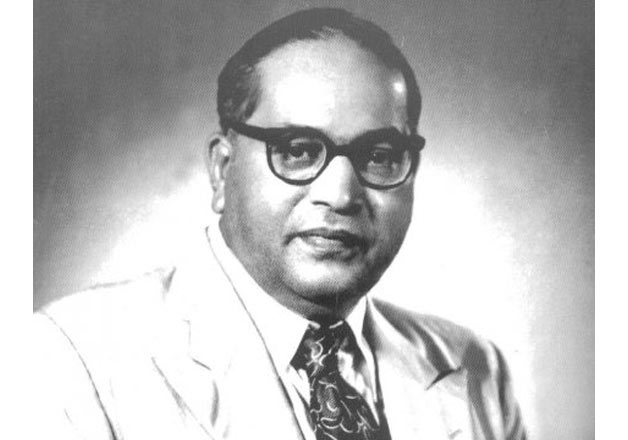
Dr. BR Ambedkar, popularly known as Babasaheb Ambedkar, was the Architect of the Indian Constitution.
Born on 14 April 1891 in Mhow, Madhya Pradesh, Bhimrao Ramji Ambedkar was the fourteenth child of his parents, Bhimabai Sakpal and Ramji. "Sakpal" was the surname of Bhimrao and "Ambavade" was the name of his native village. To avoid the socio-economic discrimination and the ill-treatment of the higher classes of the society, Bhimrao changed his surname from "Sakpal" to "Ambedkar" by the help of a Brahmin teacher, who had great faith in him.
He was a well-known politician and an eminent jurist. Ambedkar's efforts to eradicate the social evils like untouchablity and caste restrictions were remarkable.
Dr. BR Ambedkar a great scholar, lawyer and freedom fighter along with hundreds of thousands of Mahar's an untouchable caste, converted to Buddhism and changed the face of Buddhism in India. Dr. Ambedkar's conversion was a symbolic protest to the oppressions of caste inequality.
Ambedkar experienced caste discrimination right from the childhood. After his retirement from the Indian Army, Bhimrao's father settled in Satara Maharashtra. Bhimrao was enrolled in the local school. Here, he had to sit on the floor in one corner in the classroom and the teachers would not touch his notebooks. In spite of these hardships, Bhimrao continued his studies and passed his Matriculation examination from Bombay University with flying colours in 1908.

Bhim Rao Ambedkar joined the Elphinstone College for further education. In 1912, he graduated in Political Science and Economics from Bombay University and got a job in Baroda.
In 1913, Bhimrao Ambedkar lost his father. In the same year Maharaja of Baroda awarded scholarship to Bhim Rao Ambedkar and sent him to America for further studies. Bhimrao reached New York in July 1913. He immersed himself in the studies and attained a degree in Master of Arts and a Doctorate in Philosophy from Columbia University in 1916 for his thesis "National Dividend for India: A Historical and Analytical Study." From America, Dr Ambedkar proceeded to London to study economics and political science. The Maharaja also convened many meetings and conferences of the "untouchables" which Bhimrao addressed. In September 1920, after accumulating sufficient funds, Ambedkar went back to London to complete his studies. He became a barrister and got a Doctorate in science.
In 1947, when India became Independent, the first Prime Minister Pt. Jawaharlal Nehru, invited Dr. Bhimrao Ambedkar, who had been elected as a Member of the Constituent Assembly from Bengal, to join his Cabinet as a Law Minister. The Constituent Assembly entrusted the job of drafting the Constitution to a committee and Dr. Ambedkar was elected as Chairman of this Drafting Committee.
In February 1948, Dr. Ambedkar presented the Draft Constitution before the people of India; it was adopted on November 26, 1949.
In 1950, Ambedkar travelled to Sri Lanka to attend a convention of Buddhist scholars and monks. After his return he decided to write a book on Buddhism and soon, converted himself to Buddhism. Ambedkar founded the Bharatiya Bauddha Mahasabha In 1955. His book "The Buddha and His Dhamma" was published posthumously.
On May 24, 1956, on the occasion of Buddha Jayanti, he declared in Bombay, that he would adopt Buddhism. On October 14, 1956 he embraced Buddhism along with many of his followers. On same day, Ambedkar organized a public ceremony to convert around five lakh of his supporters into Buddhism. In his speech on the Eve of the great conversion at Nagpur Dr. Ambedkar said that Buddhism can serve not only this country, India, but the whole World at this juncture in the world affairs; Buddhism is indispensable for world peace you must pledge today that you, the followers of Buddha, will not only work to liberate yourself, but will try to elevate your country and the world in general.
Ambedkar travelled to Kathmandu to attend the Fourth World Buddhist Conference. He completed his final manuscript, "The Buddha or Karl Marx" on December 2, 1956. Dr. Ambedkar dedicated himself to the propagation of the Buddhist faith in India. He wrote a book on Buddhism titled "Buddha and His Dhamma" explaining its tenets in simple language to the common man. His another book is "Revolution and Counter Revolution in India". He made the provision for the study of Pali in the Indian Constitution.
Ambedkar's whole life and mission was a practical contribution to humanistic Buddhist education in India and not just intellectual and philosophical. Though he was not a Buddhist by birth but by practice and at heart he was a Buddhist.























